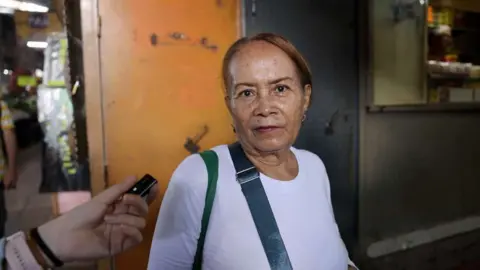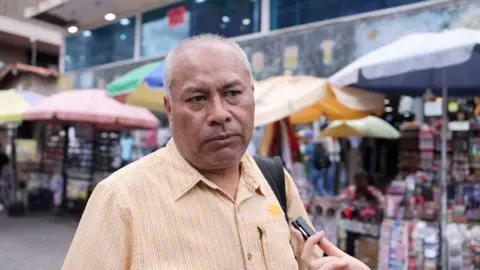Alejandro downplays the rhetoric between Washington and Caracas.
He's been selling vegetables in this market for five years. "Look, look how empty this is," he insists, pointing to a long, lonely aisle full of fresh fruits and vegetables.
A Christmas carol plays, but the festive atmosphere feels overshadowed.
The common enemy of the people is here: the sharp rise in food prices and the lack of purchasing power. In part, this is due to the rapid depreciation of the bolívar, which will have lost 80% of its value this year, according to International Monetary Fund (IMF) figures.
A kilo of chicken, for example, costs about four times the official monthly minimum wage. And although the government offers bonuses to retirees and public workers, the money is still not enough to cover the basic food basket.
Consuelo, 74, is sceptical about an armed conflict with the US and says Venezuelans cannot afford to stock food in preparation for a war.
"Let whatever happens happen! And that's it!" she tells the BBC, adding that worrying about the spectre of war doesn't help much.
"Is it true? Is it false? That just makes you sick, walking around nervous, it's better to stay calm. Emotions can also affect your health," continues this retired university professor who still works.
"I haven't done any panic buying; you need a lot of money to do that."
Two economists living in Venezuela consulted by the BBC for this report preferred not to comment for fear of government reprisals.
"Inflation has reached levels of around 20% monthly," another expert who requested anonymity pointed out.
The IMF projects a 548% price increase this year and says it will be worse in 2026, when it could soar to 629% - the highest figure on the continent.
Others see a potential US intervention as an opportunity for regime change but are afraid to speak openly about it.
"We're scared, silent, afraid they'll throw us in jail. I used to post things, but not anymore - I shouldn't - because I don't know who might turn me in," a merchant from Ciudad Bolívar (in Bolívar state, south) tells the BBC by phone.
"There's hope, faith, but people are quiet out of fear. You don't hear anyone talking about it; it's just at home, with your family, but there's a hint of joy," says the woman anonymously.

Consuelo says that uncertainty also makes Venezuelans nervous
Much of society avoids speaking openly about issues that could be sensitive for Maduro's government, after a wave of arrests followed anti-government protests over the disputed 2024 presidential elections, which have been widely rejected by the international community.
The opposition and many countries, including the US, rejected the result and recognised opposition candidate Edmundo González as the legitimate president-elect.
After the elections, more than 2,000 people were arrested, official figures show. At present, 884 individuals remain in prison for political reasons, according to the non-governmental organisation Foro Penal.
Barbara Marrero, a 40-year-old pastry chef, says: "We're all waiting for something to happen because it's fair and necessary. We've been living in absolute misery for years.
"Venezuelans live day by day waiting for something to happen, but everyone is afraid [to speak] and nobody says anything."
Esther Guevara, 53, who works in a medical lab, doesn't hide her concern amid tensions over the US naval fleet deployment.
"I'm worried because I don't really know what's happening - they might invade, strike… people think it will be ok, but this is serious," she says. "A lot of innocent people could die."
"I feel like something's cooking out there, but I'm waiting," she adds.

It's now midday.
Everything goes on as usual along a busy boulevard in eastern Caracas. Street vendors pushing sales. Pedestrians coming and going.
There's Javier Jaramillo, 57, looking for goods to resell at Christmas. He's curious about the USS Gerald R Ford, the aircraft carrier Washington moved to the Caribbean.
"I don't think that attack will happen. I think there could be dialogue, an agreement, or a deal."
Still, he says that when there are power cuts, he thinks: "'They've come in,' 'They're going to come in.'"
Trump has suggested he is open to a diplomatic dialogue with Maduro, but also said he would not rule out military action.
Either way, Javier repeats: "We're more worried about food. Venezuela is in bad shape. Inflation is eating us alive."



You must be logged in to post a comment.